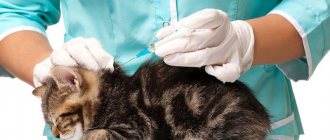For many owners, pets become real family members.
But, unfortunately, their life is much shorter than that of a human, and owners sometimes have to make a difficult decision - should they euthanize a cat if it is sick and suffering, or allow it to live out its life? The concept of euthanasia. The term "put to sleep" can be used in two meanings.
In the first case, a medicated sleep is meant, into which the cat is immersed for any procedures, surgery, or to avoid stress during transportation. In this case, you can euthanize your pet yourself using sedatives such as Kot-bayun or Fitex. You can buy them at a pet store, where a sales consultant will tell you how to choose the right dosage of the drug. After drinking the required dose of sedative, the cat will settle down and fall asleep on its own.
If it is necessary to euthanize an animal for the purpose of medical intervention
... sedatives will not be enough; The veterinarian will put the cat under anesthesia using drugs that are not commercially available; they are available only to veterinary clinics with a special license.
The second, more common meaning of the expression “putting a cat to sleep” implies the euthanasia procedure. It is the intentional, deliberate taking of life to end suffering, carried out in a humane, painless manner.
Important! Only a qualified veterinarian can carry out such a procedure!
When is euthanasia the best choice?
The decision to terminate the life of a beloved pet is associated with great emotional stress and moral torment over the correctness of the decision being made. It is difficult for any owner to part with his pet, but sometimes the situation is so difficult that further delay in resolving this issue only brings suffering to the cat, and, possibly, a painful death in agony.
There are several cases when the issue of euthanasia is particularly acute:
- Rabies is a disease that is fatal not only to animals, but also to humans. Euthanasia is necessary to prevent a terrible epidemic. This is the only case when the decision is made by the veterinarian; in other circumstances, the owner always has the final say.
- Severe incurable diseases, which include trypanosomiasis, anthrax, foot and mouth disease, tuberculosis and others.
- Oncological diseases.
- Injuries incompatible with life.
- Congenital pathologies incompatible with life.
- This list does not mean that as soon as your cat is diagnosed with a malignant tumor or infectious disease, you will have to immediately think about euthanasia. With many diseases, with proper treatment and regular medication, an animal can live for several more years. Therefore, the first thing you need to do is visit a veterinarian, perhaps even several, to select the right treatment. No veterinarian will undertake to euthanize a cat that can be cured.
How to euthanize a cat
Pets cannot live longer than their owners, no matter how sad it may sound. Sometimes situations even arise in which it is necessary to euthanize a cat much earlier than its old age. Owners should always monitor their pets and monitor their health. If necessary, the pet owner must ensure that his cat passes into another world absolutely painlessly, without torment and incredible suffering. Sometimes euthanasia becomes a necessity, so this procedure should be trusted only to a real specialist.
When to euthanize a cat
Euthanasia of cats is not a crime under the law, which is why even pets can die easily and calmly. Currently, many of their owners decide to do this, because this procedure is the most humane of all other methods. Even if the owner himself dreamed that his pet would live as long as possible, sometimes euthanasia has to be done.
Naturally, at the whim of the owner, euthanasia is not carried out. If an animal has lost hearing or vision, goes to the toilet in the wrong place, or the owner is simply tired of it, no one will perform euthanasia. To euthanize a pet, there must be quite significant indicators. If, after all, the owner intends to carry out this procedure, then he must approach this decision with all responsibility.
You should definitely go to a good clinic and find a real specialist there. It is veterinarians who carry out all the necessary diagnostics and examination of the animal, and then decide on the need for euthanasia. Only if the clinic is equipped with all the equipment and devices will a specialist be able to correctly diagnose and make the right decision.
For what diseases should a cat be euthanized at home?
Pets are often euthanized if they are sick with diseases that are terrible and incurable. If a veterinarian discovers the following diseases in a cat, then euthanasia becomes a mandatory procedure.
Anthropozoonoses are diseases that can affect both people and animals. The body is affected by various infectious microorganisms. There are quite a large number of them, not all of them are curable and require mandatory euthanasia of the cat.
Of course, if a pet is diagnosed with rabies, then it is necessary to urgently euthanize the animal and report quarantine to the state health service.
Leptospirosis also poses a great danger, because at the very beginning of the disease, humans and animals do not have any symptoms. However, later death may even occur.
In some cases, beloved animals suffer from the disease for a long time and experience unspeakable suffering as a result. Sometimes no medications help, and it is difficult to reduce the pain of a pet. This could be cancer in the last stage, because metastases rapidly affect vital organs and do not allow the cat to live normally. It can also be kidney failure, which causes swelling of the brain and death.
If the veterinarian informed the owner about the cat’s incurable disease, and the owner does not notice the animal’s suffering, then you should not think that everything is in order. Usually cats do not show that something is wrong with them; they simply hide in secluded places and experience pain all alone.
Abnormalities at birth and trauma may also be reasons why a cat should be euthanized at home. If an animal falls from a great height, injuries can affect organs important to the pet’s life, so the body stops functioning as it should.
It should be realized that euthanasia can only be carried out in cases where the injuries really cannot be cured, due to which the cat is in great pain and suffering. If the injury can be cured even through surgical or expensive intervention, then no doctor will undertake to euthanize a cat at home. Even if the animal becomes disabled, it will still be able to exist normally and continue to love its owner.
If the veterinarian makes a disappointing diagnosis and recommends euthanizing the cat, then it is better to go to several more specialists who can confirm the diagnosis. Sometimes you come across unprofessional doctors who simply do not know how the animal can be cured, and therefore recommend euthanizing the cat at home. Many simply do not have the necessary qualifications in this matter; they can take the life of a practically healthy pet.
If the owner turned to a general veterinarian, this does not mean that he knows perfectly well about all diseases and methods of treating them. If the doctor diagnoses cancer, it is recommended to contact a professional oncologist so that he can confirm the previously made diagnosis. Well, only a neurologist can reliably determine spinal injuries. It is also often recommended to euthanize a cat at home by specialists who initially began to treat the pet incorrectly and now cannot stop the development of the disease.
Euthanasia of a cat at home is now a very common procedure, because it is absolutely painless and can save the unfortunate pet from suffering. Euthanasia involves two stages. First, the cat is given general anesthesia so that it can no longer understand or feel anything. Well, after this, specialized drugs are introduced into the blood, which allow the animal to end its life. You should never agree to a euthanasia procedure without using anesthesia, because in this case the cat will understand what is happening to it, suffer and believe that its beloved owner turned out to be a traitor.
If the owner of the animal clearly understands that euthanasia is necessary, then it is better to do everything possible to ensure that the pet feels comfortable in the last minutes of its life. Therefore, it is worth contacting specialists and ordering a cat euthanization service at home. A specialist will come to the owner at any time convenient for him and carry out all the necessary manipulations. Under no circumstances should you carry out this procedure yourself. You cannot find medications for euthanizing a cat in any pharmacy, because each of them requires a veterinarian’s prescription. And even if the medicines are already on hand, then without special qualifications it will be impossible to carry out euthanasia in a humane manner. The cat will certainly suffer from the inexperience of its owner, and the owner will never be able to forgive himself for what he has done.
It is necessary to euthanize a cat at home so that the animal can see its familiar surroundings in the last minutes of its life, so that it does not think about anything bad. Also, do not forget that after death, something will need to be done with the pet’s body. At the clinic, you can immediately order the removal of the body and its cremation, and then even take the urn with the ashes of your beloved cat to your home.
How is euthanasia carried out?
It is possible to euthanize a cat in two stages. First, the pet is immersed in a deep narcotic unconsciousness. The veterinarian administers a drug that takes effect within one minute. After this, the doctor must check how deeply the animal has gone into anesthesia and checks for the presence of basic reflexes. Only in their absence can the doctor proceed to continue the procedure. Another drug is injected into the body, which stops the cat's breathing and brain function. Then the doctor is again obliged to check all reflexes and determine the time of death. The specialist cannot leave the animal until he is absolutely sure that it has really passed away.
After a death has been recorded, the owner must choose what to do with the body:
- bury the cat in a specialized cemetery for pets;
- bury in your own plot;
- order an animal cremation procedure;
- send the body to a specialized facility for disposal.
You should carefully monitor the cat’s lifestyle and its state of health, because only with good care of your pet will you be able to enjoy life with it for many years and not even think about the euthanasia procedure. But if this does happen, then you shouldn’t be too upset, because the specialists will do everything in the best possible way, and the owner will not feel pangs of conscience in front of his pet.
Criteria for decision
However, whether to euthanize a cat, even if it is terminally ill, is always decided by the owner. No matter how difficult it may be, you should approach this issue with a cool head and assess the pet’s condition according to the following criteria.
- Is the cat capable of eating on its own and is the food absorbed by the body?
If an animal refuses to eat, it will most likely experience severe pain while eating. In older animals, teeth and joints often suffer. If a cat refuses to eat or all the food eaten is vomited, exhaustion of the body will inevitably lead to death.
An animal can be considered emaciated if it has no subcutaneous fat and even from a distance prominent ribs and spine are visible.
- Does the cat come to the water bowl on its own?
Water is the most necessary element for the functioning of the body. Sick and elderly animals need more water than healthy ones, because it helps remove toxins from the body.
Attention! Be sure to place a bowl of water as close to the cat's bed as possible so that he can drink at any moment. By avoiding pain, animals can tolerate thirst, which puts even more stress on the body and can cause nausea and pain in the kidneys.
If, while moving, your cat experiences such severe pain that it refuses to even go near a bowl of water, it’s time to think about whether it’s humane to prolong the animal’s suffering.
- Does the cat go to the litter box?
Cats are naturally very clean, and if they cannot control their bladder or suffer from constant diarrhea, the mental suffering from loss of dignity is added to the physical suffering.
In older animals, severe pain is often associated with arthritis, and climbing into a tray with high sides is not possible.
Advice. If your cat often walks past the litter box, try buying a different one with lower sides, and also discuss taking pain medications with your veterinarian.
- Can a cat wash itself?
If your pet has an unpleasant odor and his fur looks dirty and matted, he needs your help. The cat needs to be scratched regularly, and the fur and anal area should be washed or wiped with wet wipes.
If the cat can no longer wash himself, there is a high probability that he is too exhausted and experiences pain during any body movement.
- Does the cat experience pain when at rest?
This question should be decisive when deciding whether euthanasia is necessary or not. If the cat is rapidly losing weight, cannot drink or go to the litter box on its own; if you notice your pet's aggressive behavior when trying to touch it; if he constantly meows pitifully or screams loudly in pain; flattens his ears and beats his tail in an attack of muscle spasms - he is constantly haunted by pain. If an animal is constantly suffering, unable to even sleep peacefully, and this condition can no longer be changed, euthanasia will be a humane solution.
Euthanasia procedure: technical and ethical aspects
Some pet owners prefer not to euthanize their cats, but to let them die on their own. Yes, psychologically such a death is easier to bear (it gives the impression of being natural), but such a decision almost inevitably dooms the animal to prolonged suffering.
When carrying out euthanasia, a drug for anesthesia is injected into the cat's body - but in a dose significantly higher than the recommended one. As a result, the cat simply falls asleep, after which brain death occurs due to lack of oxygen. For some time, cardiac activity still persists - but it either fades out on its own, or after brain death is determined, it is stopped by injection of a special drug.
This technique eliminates any painful sensations, therefore euthanasia of a cat should be considered as an act of humanity and the last service of the owner to the pet, which for many years has delighted people with its presence.
Preparation
Preparing to euthanize a beloved cat is solely necessary for the owner.
First, visit several veterinary clinics to make sure that your pet's condition will not get better. A good veterinarian will not undertake to euthanize a cat without good reason!
Afterwards, decide on the clinic where you will say goodbye to your pet. It will be better if the choice is made based on reviews from friends, since the procedure can only be performed by a qualified specialist in a clinic licensed for euthanasia. The veterinarian must tell you how and with what medications the procedure will be carried out; if this information is hidden, the veterinary clinic is likely violating established rules and your cat will not die quietly in his sleep, but will die painfully in agony.
Temporary euthanization of a pet
This type of euthanasia is used if, for example, hygiene procedures are required. Veterinarians do not recommend using strong anesthetics or barbiturates for this purpose, because this is dangerous. In case of even the smallest overdose, the animal can die. It is better to give preference to sedatives that are available without a prescription. These include Stop-Stress, Cat-Bayun and others. Propofol, Vetranquil and Rothemar are used by veterinarians, but cat owners are better off not touching them so as not to harm the pet.
Euthanasia procedure
Euthanasia of a cat is carried out in two stages. The first is direct euthanasia, immersing the animal in deep anesthesia. It is produced by the same drugs that are used for anesthesia during surgery - Torbugesic, Ketamine and other drugs of the barbiturate group. The difference is that with normal anesthesia, brain activity is only temporarily suppressed, but with euthanasia, the dose of the drug is so high that the consequences of severe brain depression are irreversible. In essence, this is the death of the animal.
At this stage, the owner makes sure that the cat is sound asleep and does not feel anything, says goodbye to his pet and leaves the clinic. The second injection will be given after 20 minutes and without witnesses, in order to avoid unpredictable reactions from the grief-stricken owners.
The second stage of euthanasia is an injection of a lethal dose of drugs such as Ditylin, Pentobarbital and others, which cause breathing and heartbeat to stop.
Then the veterinarian ascertains the death of the animal by listening to the heart with a phonendoscope; in exceptional cases, an ultrasound is performed.
Some clinics provide services for the disposal or cremation of animal bodies for a fee; this issue should be clarified in advance, since self-burial is prohibited due to the unsanitary nature of such actions.
What is euthanasia?
There are several ways to euthanize an animal, but medication is considered the most humane. All veterinary clinics located in the Russian Federation use only this technique. The process itself consists of the subsequent administration of drugs that have a strong effect intramuscularly or intravenously. At the first stage, the animal falls asleep, and then the respiratory and cardiac function ceases.
It is worth noting that it is recommended to entrust euthanasia to a professional veterinarian rather than trying to do it yourself. Trying to alleviate the suffering of a pet by an inept owner will only lead to more suffering.
There are two types of euthanasia - directly in the home or in a veterinary clinic. The first option has its positive sides. If a cat has a fatal, serious illness, then being in a familiar environment until the last minutes of life is much more beneficial than a stress-related trip to the veterinary clinic. The methods that a veterinarian invited to your home will use will be no different from those offered at the hospital.
If necessary, the specialist will give family members a certain amount of time to say goodbye to the pet, and only after that a drug will be administered to put the animal to sleep, and then medications to terminate the life. Owners can stay with their four-legged friend until the very end, but this is a personal decision for each individual.
A trip to the veterinary clinic also has its advantage; if the owners have a high level of receptivity and affection for the pet, then it is better to euthanize it outside the home. With this option, only good memories remain, and it is better to remember the animal forever full of strength and energy.
How to euthanize a cat at home
Now, knowing how the euthanasia procedure occurs, you can answer the question yourself - how to euthanize a cat at home yourself. The answer is simple: without causing the animal suffering - not at all. You simply won’t be able to find the drugs you need on sale, and replacing them with analogues can cause seizures, cerebral hemorrhage and other terrible consequences.
But sometimes euthanasia at home becomes the only option, the reasons may be different: the cat suffers greatly, and transportation will cause him even more pain; it is not possible to go to a veterinary clinic due to the long distance; I don’t want to disturb the animal, but give it the opportunity to die at home, in a calm and familiar environment. In this case, you can invite a veterinarian to your home.
The cost of euthanasia in a clinic can vary greatly in large and small cities; on average, it ranges from 1 to 2 thousand rubles. At home, the price of euthanizing a cat will increase by another thousand rubles. Only the clinic will be able to answer exactly how much it costs to cremate a body, because the price range is very large - from 1 to 4 thousand.
Each scenario has two sides: you should refuse euthanasia at home if children can become witnesses or you yourself are very impressionable, and it will be difficult for you to remember the death of a pet in your home.
How to euthanize a cat without a veterinarian?
Cats are considered one of the most loving and inspiring animals in the entire world. This is a beautiful animal, which is considered throughout the world a symbol of love and peace.
But one day everything will come to an end, and all we can do is to make it as painless as possible. When your cat has been a part of your life for so many years, it's not easy to say goodbye.
But when you notice that your cat is no longer enjoying her life or is suffering from a variety of health problems, or she doesn't have the energy to stand on her own and she can't defend herself. This is a good time to say goodbye to both you and your cat.
© shutterstock
One of the main causes of such problems is aging, and an overgrown cat cannot survive on its own. And when you see a crying cat, it means that he is giving you a signal that the time has come.
In such circumstances, rather than making any emotional decision, it is better to consult a veterinarian. He will guide you; what to do and how to do it. The final decision will be yours whether you want to euthanize your cat at home or take her to the veterinarian's office.
You can say goodbye to your cat at home. And after that, you can euthanize him/her or let the vet do it for you.
The veterinarian primarily uses euthanasia, and this can cost you a serious amount of money. If you can afford it, you can let the vet put your cat to sleep, but if you can't, it's best to use home methods and do it yourself.
Religion and euthanasia
Believers will definitely ask themselves the question: Is it a sin to put a cat to sleep? Regarding the euthanasia of people, the answer of religion is unequivocal - this is murder, which means it is a sin. With animals, not everything is so simple; it will be better if you consult your confessor and be calm about the correctness of the decision made.
In Christianity, killing an animal is not considered a sin because animals do not have souls. Another important thing is for what purpose you are committing euthanasia. If out of your own whim, or to save yourself from the difficulties of caring for a sick animal; or if you are tired of the cat; or he is aggressive or marking territory - undoubtedly, the Church will consider your action a sin. But if euthanasia is an act of mercy, relief from suffering, then your soul can rest assured that you did the right thing.
Anyone, even the most persistent person, will torment himself with the question: has he taken on too much? Have you appointed yourself the arbiter of destinies? You need to understand that you gave your four-legged friend all your love, and did not commit murder, but saved him from fading away in terrible pain.
When should cats be euthanized?
If you love cats deeply, your mind and heart won't agree that your cat's time in this world is almost over. But if you want your cat to die peacefully, then it is up to you that whenever you see your cat who is no longer enjoying his life and is suffering from anxiety, pain or any illness, first take your cat to the vet. He will clearly tell you whether the time has come or not.
Chemicals that can put a cat to sleep without the help of a veterinarian
- Aspirin : Cats are very sensitive to certain chemicals, and aspirin is one of them. Cats' bodies do not synthesize as quickly as the human body, and they do not have the digestive ability to dissolve it in their bodies. Overdosing cats with aspirin is one of the most painless ways to put your loving cat to sleep for life. 2 to three doses of aspirin will lull them to sleep peacefully, and 4 to 5 doses of aspirin will lull them to sleep quickly.
- Insulin : Although insulin is considered a life-saving medicine for many patients with diabetes, you can easily bring insulin from the pharmacy. But large amounts of insulin can put your cat to sleep for life by lowering blood glucose levels. You can inject a cat with a large dose of insulin, and within 10 minutes it will lead to comma and, ultimately, a peaceful and painless death.
- Sleeping pills : Sleeping pills are one of the most effective methods of putting cats to sleep. There are so many sleeping pills available in the market and the government has allowed people to use these chemicals to put their pets to sleep. These medications can be administered to pets or administered orally. In both cases, in order for a cat to fall asleep painlessly, you only need 5-10 mints.
© shutterstock











